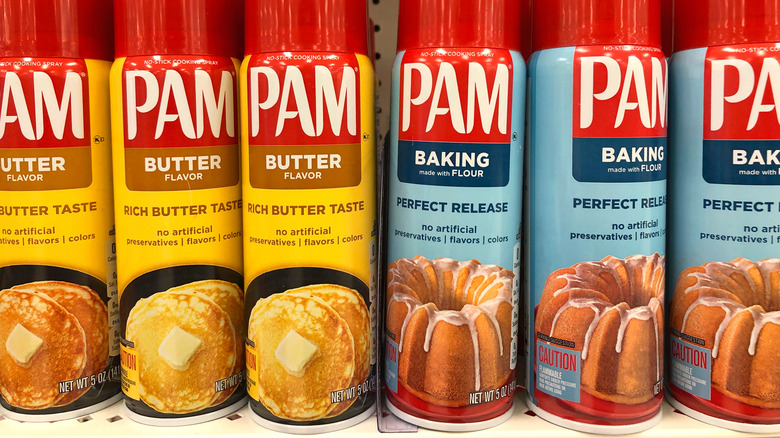The Major Cooking Spray Mistake You Have To Stop Making
Nonstick cooking sprays like PAM can be lifesavers in the kitchen. Anyone who's ever had a hard time getting a cake or piece of meat unstuck from a skillet knows the pains of skipping the important step of adding some grease to the pan first. These cooking sprays are great because they evenly apply a layer of fat to the surface of pans, cake tins, and baking sheets. There's just one huge problem with these products though that will change the way that you use them.
If you've ever worked with nonstick pans, then you know that even the best ones you can buy aren't always completely nonstick. At least not without a little help. Sure, they tend to work a lot better than most other cooking surfaces, but they still need you to add some grease for the best, most consistent results. So of course, using your best nonstick spray would seem like a natural fit, but actually, you're likely doing more harm than good. This is because cooking sprays contain more than just cooking oil, and those other components can ruin a nonstick finish over time.
Why do cooking sprays ruin nonstick pans?
Cooking sprays are great because they fire out of the can in such an even aerosol that it makes covering the entire surface a breeze. To get that perfect spray, however, they use chemical propellants like soy lecithin (among others). While these are safe to cook with, and won't immediately harm your nonstick pans, over time they will build up in a gummy residue. This ruins the original nonstick coating, and will make it less effective to cook with. There are still many good uses for these sprays, like making cheese graters easier to clean, but it is important to know when they should be used.
While the best way to preserve your nonstick cookware is to never use these sprays on your pans in the first place, you can try and remove buildup by heating up two parts water and one part vinegar in your pan until it's simmering. Nonstick pans are much safer to cook with than in the past, but they still require a fair amount of care to ensure that you aren't damaging them.
What to use instead
That doesn't mean that your nonstick pan will be able to do its job without any added help though. Nonstick pans will still perform best when they have a small amount of oil or butter added to them. An easy way to do this is to cover a paper towel with a small amount of oil and wipe it around the surface of your pan before you start cooking. This will give you the kind of even application that you want from a cooking spray without the added damage to your pan.
There are also oil misters that are available for purchase as well. These products mimic the type of wide application as cooking sprays, but let you use whichever oil you prefer, and won't ruin your nonstick pans. Just add the oil or butter before heating the pan, being sure not to get it too hot. Most nonstick pans are made of aluminum and conduct heat incredibly quickly. They just need a few seconds on moderate heat before you add any other ingredients.


